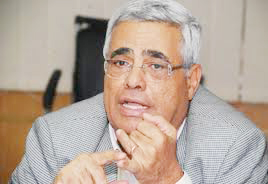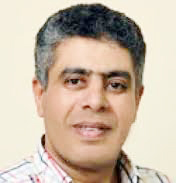Sunday night turned into Monday morning with Egyptians still waiting for an anticipated television interview with President Mohamed Morsi. The president offered no explanation for the delay, and several newspaper columnists criticized Morsi for leaving millions of citizens waiting late at night for the long-awaited interview. The broadcast was supposed to begin at 8 pm Sunday but didn’t being until around 2 the next morning.
Hassan Nafaa
Running out of re-sits
Al-Masry Al-Youm newspaper
Recalling the hours Egyptians were glued to their television screens waiting for Morsi’s two-hour interview, Nafaa chided the president for the big mistakes he has made since he took over in June. When the interview finally aired, Morsi admitted to his interviewer, his ex-adviser Amr Al-Leithy, that he is only human and therefore, makes mistakes like everyone else. Despite his appreciation of that admittance, Nafaa wanted to know just how many times a president is allowed to commit the kind of big blunders he blames on Morsi.
Among those errors, Nafaa said: Morsi’s constitutional declaration in which he awarded himself sweeping powers, appointing Hesham Qandil as prime minister and refusing to sack his government.
Morsi, Nafaa said, is now like a failing student who is allowed to re-sit his exams over and over, and he’s running out of chances. Can Morsi believe he’s moving in the right direction even after the resignations of more than half of his advisers and aides?
Morsi should start fresh by reviewing his previous decisions in office, leaving the presidency and running again in a new election, Nafaa said.
Wael Qandil
Morsi, the visitor in the dawn
Al-Shorouk newspaper
When a president announces he will be on television at 8 pm and shows up at 2 am the next day, political errors and detachment from ordinary citizens are to blame, not technical difficulties, Qandil said.
However, Morsi and his Muslim Brotherhood party have just recently come into the public eye and can’t be blamed for the extent of his political ignorance. In addition to airing the interview very late before a business day, the public debate around the interview came in the fact that it was conducted by his ex-presidential adviser Amr Al-Leithy, rather than the content of his responses.
Amid all this noise about the upcoming parliamentary elections and the opposition’s threats to boycott, we find the president calling for another round of dialogue to discuss guarantees of the elections’ transparency and integrity.
At the same time, Qandil understands that many political figures are concerned with the issue of international monitoring of elections. He urged all political powers to take real action and prepare for the elections instead of wasting time and effort on meaningless talks.
Emad Al-Din Hussein
When will the Muslim Brotherhood leave power?
Al-Shorouk newspaper
Hussein refutes the idea that the fear of God or the desire to fulfill their promises to their voters will ever convince the Muslim Brotherhood to act democratically.
Probably the only factor that obliges the Islamist group to be democratic is the presence of solid and genuine political groups that fiercely compete with them. The writer compares the Brotherhood to the ousted President Hosni Mubarak. He recalls how Mubarak was not scared by the repeated demonstrations against his rule in front of the Press Syndicate. He once stated that he will be afraid to leave power only if he wakes up one day to find Tahrir Square packed with protesters. Of course, that actually happened. The Brotherhood are exactly like Mubarak today.
The Muslim Brotherhood will not be shaking to wake up and see a number of demonstrators gathering in front of the presidential palace while throwing Molotov cocktails at the gate guards. They will only start to think about the risk of departure when they find strong civil society organisations, serious businessmen and strong opposition coming together to protest against the Islamists’ rule.
Hussein believes that the only way out for the Muslim Brotherhood is for citizens to unite against them instead of putting on more fruitless demonstrations.






